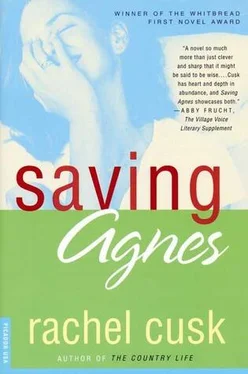FEMINISM had discovered Agnes in her first year at university and, recognising in her the potential for prime, dissenting flesh, had been prepared to fight long and hard for her soul. While Agnes’s resistance had been what might be called textbook, her capitulation was less so. Attending the women’s group to which Nina had invited her, she had become so terrified by their proselytising and their promises of bondage that, when asked for her opinion, she had thrown them the first scrap of meat she could lay her hands on.
‘I like having doors opened for me!’ she had cried, scarcely believing the words — which she had heard reverberate around the counties of her youth and had thought, even then, absurd — had come from her mouth.
Thankfully this missile, being old and ubiquitous by design, was shot down with consummate ease by her companions, who became quite friendly in their relief that she had not mounted a stauncher defence. The door to cultural emancipation had been firmly opened and Agnes found that, try as she might, it would not shut.
What none of these genial campaigners knew was that Agnes had lived most of her life in constant fear and loathing of her own sex. The convent school where she had grown up had been red in tooth and claw with female cruelty; and when her new friends spoke of the women’s community, Agnes was beset by images of hooded nuns, ungodly punishments and peer-group persecution. Unspeakable things had gone on there, things which she had thrown into a cauldron of grief and terror in her heart and which now bubbled like a noxious soup of carping, taunting, bitching, menstruating femininity. The taste of it still rose in her throat like bile. Eventually she could talk of male oppression as freely as anybody; but in those days the cheerful indifference of men and their unemotional talk, although later a source of grief and frustration, was something of a relief.
Agnes bought feminism because she was afraid of women; and, as with so many things in her life, when she was driven by her sense of what ought to be it was some time before truth eventually caught her up.
The first thing she perceived about feminism was that it allowed women to be fat and ugly. As if such qualities were infectious, Agnes secretly put this idea to one side. Like aspirin, she found ideologies hard to swallow whole. Indeed, her mother had often railed at her for what she called her ‘pick and mix’ attitude to religion. Agnes’s God floated on a soft cloud of love and forgiveness and was far too busy trying to justify famines and earthquakes to care whether Agnes told lies or used contraceptives. Along the same lines, she selected equality and freedom from domestic servitude from her new creed, and disdained the promise of liberation from the trappings of the feminine stereotype.
‘If we’re truly free, then we’re free to wear make-up,’ she told Nina, who for some reason did not seem impressed by such logic.
Agnes was not particularly enamoured of the feminine stereotype: it just so happened that it offered a convenient and effective means of disguise. She created herself daily, and did not want to know — or others to know, for that matter — what murky truths lay beneath her finery. That by disguising these smaller truths she was merely uncovering several larger ones was clear only to those who threatened to address the defect of her superficiality; but what to them was a disorder, was to Agnes the very thing that kept chaos at bay. Feminism was for her a war of words, a catalogue of social injustices that were as interesting but as unrelated to her as a history book. She saw in its medicines no cure, merely a placebo of self-acceptance that could aid only those with a less intimate knowledge of the rules of deception than herself.
‘Your understanding of the relationship between form and content needs work,’ wrote her tutor at the bottom of an essay, but Agnes saw in such comments no clues; only a vast sea wall beyond whose forbidding stone a boiling ocean crashed and foamed like a rabid dog.
Later, Agnes found easier ways of justifying self-adornment. By exploiting the currency of their social acceptability, she argued, women could precipitate change from the heart of the patriarchal establishment. She shared this opinion with her parents when she went home one weekend.
‘Chaps are more likely to listen to a pretty girl,’ mumbled her father, nodding his agreement behind a newspaper.
‘You look amazing,’ said John, watching her undress in the shuttered light. ‘You look like a stork.’
It was ninety-eight degrees in the dark. The white sheets were limp with sweat. They were in Seville, with the sounds of mopeds and laughter from cafés making waves through the thick air. They were melting in Seville. It seemed to Agnes they were dying in Seville.
‘Thanks a lot,’ she said, turning from him. Her pique fizzled and blunted itself in the heat.
‘Don’t.’ John sat up in bed. ‘Don’t move. Let me look at you.’
She turned around, the bars of light from the shutters appearing to swim over her naked body like eels. Once his fascination had disturbed her, but now she had come to know, if not to understand it. She knew she could rely on it if all else failed.
‘Why do you love me?’ he marvelled, shaking his head. ‘I see other men looking at you. You’re so much better than me. What do you see in me?’
He said things like that sometimes. He said they were his rape fantasies. Agnes, not understanding, was frightened of such allegations of superiority. She perceived within them intimations of incompatibility and hence desertion, little landmines of truth in a desert of lies. He pulled her down on top of him.
‘Why?’ he whispered. His white teeth shone in the dark like a crescent moon.
‘Because,’ said Agnes.
Her body felt like it was melting into his. She clung to the moment. A second skin, irremovable.
‘Agnes? It’s Tom.’
‘Oh!’ Agnes disengaged the telephone cord from where it had wound itself round a table leg and sat down. ‘How are you?’
‘Well, this phone box stinks of piss but apart from that I’m okay.’ The tinny roar of traffic drowned his voice.
‘Where are you?’
‘Outside your house. Can I come in?’
A minute later her brother stood on the doorstep. He looked too big for it. Tom had always had the dubious ability to make his surroundings appear exiguous and rather shoddy.
‘Nice suit,’ said Agnes.
‘Savile Row.’ He flicked at his shoulder. ‘Hand made. The ladies love it.’
He grinned and negotiated the doorway by lowering his head exaggeratedly.
‘My sister the cave-dweller,’ he said, strolling into the sitting-room. He looked around. ‘Nice place. Good ventilation too,’ he added, running his fingers over the crack in the wall.
‘Where did you think I’d be?’ Agnes inquired. ‘In a cardboard box under Waterloo Bridge?’
‘I’ll admit you’ve always been a bit prolier-than-thou,’ replied Tom, ‘but I think that would be stretching it.’
Such power struggles tended to characterise the early stages of their meetings. While the exaggeration of their differences had long since been employed as a method of partly ameliorating them, Agnes had begun to nurture an unspoken anxiety of late that on one of these ice-breaking occasions she would discover Tom had actually become the person he caricatured so expertly.
‘Do you want something to drink?’ she said.
‘Great.’ He grinned. ‘I’ll have some champagne.’
Agnes was astounded.
‘We don’t have any,’ she replied.
Tom rummaged in his bag and produced a bottle with a flourish.
‘You do now,’ he said.
‘You shouldn’t have,’ she murmured penitently.
Читать дальше












